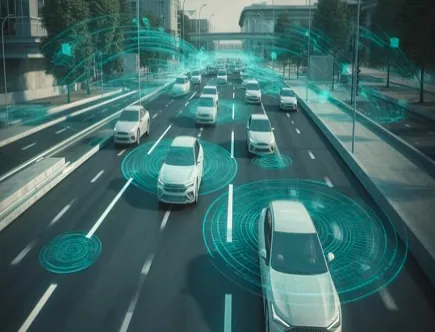Artificial intelligence is revolutionizing the automotive industry, enabling the development of self-driving vehicles that promise increased safety, efficiency, and convenience.
AI and Autonomous Vehicles
Artificial intelligence is revolutionizing the automotive industry, enabling the development of self-driving vehicles that promise increased safety, efficiency, and convenience. Artificial intelligence in cars is at the heart of autonomous driving, helping vehicles perceive their surroundings, make real-time decisions, and navigate complex environments.
This AI and Autonomous Vehicles Course provides an in-depth exploration of artificial intelligence and cars, focusing on the AI technologies that power autonomous vehicles. It covers key topics such as machine learning, sensor fusion, computer vision, and path planning, along with discussions on ethical and regulatory considerations. Participants will gain a solid foundation in the principles behind AI-driven autonomous systems and understand their impact on the future of mobility.
This course equips learners with the knowledge required to engage with cutting-edge developments in AI for self-driving cars and smart transportation systems.
This course is designed for automotive engineers and professionals interested in autonomous vehicle technology, as well as AI and data science practitioners looking to apply their expertise to self-driving systems. It is also suitable for researchers and students in the fields of artificial intelligence, robotics, and automotive engineering, along with policymakers and regulatory professionals focused on AI-driven transportation. Additionally, technology enthusiasts eager to explore the future of artificial intelligence in cars will find this course valuable. While no prior experience in AI or autonomous vehicles is required, familiarity with basic programming and automotive systems will be beneficial.
Understand the fundamental role of artificial intelligence in cars and autonomous systems.
Explain how machine learning algorithms enable self-driving capabilities.
Analyse the integration of sensors, cameras, and LiDAR in vehicle perception
Explore computer vision techniques for object recognition and environmental awareness.
Understand path planning and control mechanisms in autonomous vehicles.
Evaluate AI-driven safety features and ethical challenges in self-driving technology.
Examine how autonomous vehicles interact with smart city infrastructure.
Discuss future trends, challenges, and advancements in AI for mobility solutions.
-
- Overview of artificial intelligence and cars
- Evolution of autonomous vehicle technology
- AI’s role in perception, decision-making, and control
- Key challenges and opportunities in AI-driven mobility
-
- Supervised and unsupervised learning in self-driving cars
- Neural networks and deep learning applications
- Reinforcement learning for adaptive driving behavior
- Real-world AI models used in autonomous vehicles
-
- LiDAR, radar, and camera-based perception systems
- Sensor fusion techniques for enhanced environmental awareness
- Data collection, processing, and real-time decision-making
- Limitations and improvements in autonomous vehicle sensors
-
- How AI-powered vision systems detect and classify objects
- Pedestrian, vehicle, and obstacle recognition algorithms
- Image processing and 3D mapping for navigation
- AI’s role in traffic sign and signal interpretation
-
- AI-driven navigation and route optimization
- Motion planning and predictive control
- Collision avoidance and adaptive cruise control
- AI-based decision-making in dynamic environments
-
- AI’s contribution to accident prevention and risk assessment
- Ethical considerations in self-driving technology
- Decision-making in critical situations (e.g., the trolley problem)
- Regulatory frameworks and compliance for AI-powered vehicles
-
- AI’s role in connected vehicle infrastructure
- Communication between autonomous cars and smart traffic systems
- The impact of AI on urban mobility and transportation planning
- Case studies on AI-driven smart transportation networks
-
- Advances in artificial intelligence and cars
- AI and electric vehicle integration
- Challenges in scalability, cost, and public adoption
- The road ahead: Fully autonomous transportation systems
Earn a Professional Certificate
Earn a certificate of completion issued by Learn Artificial Intelligence (LAI), accredited by the CPD Standards Office and recognised for supporting personal and professional development.

Key Aspects of Course

CPD Accredited
Earn CPD points to enhance your profile

Free Course
This course is free to study

Self-Paced
No time limits or deadlines

Flexible & 24/7 Access
Learn anytime, anywhere

Build In-Demand Skills
Get job ready

Updated AI Skills
Stay current with AI advancement

Global Learning
Accessible Worldwide

Premium Materials
High-quality resources

Employer Approved
Boost your career prospects



